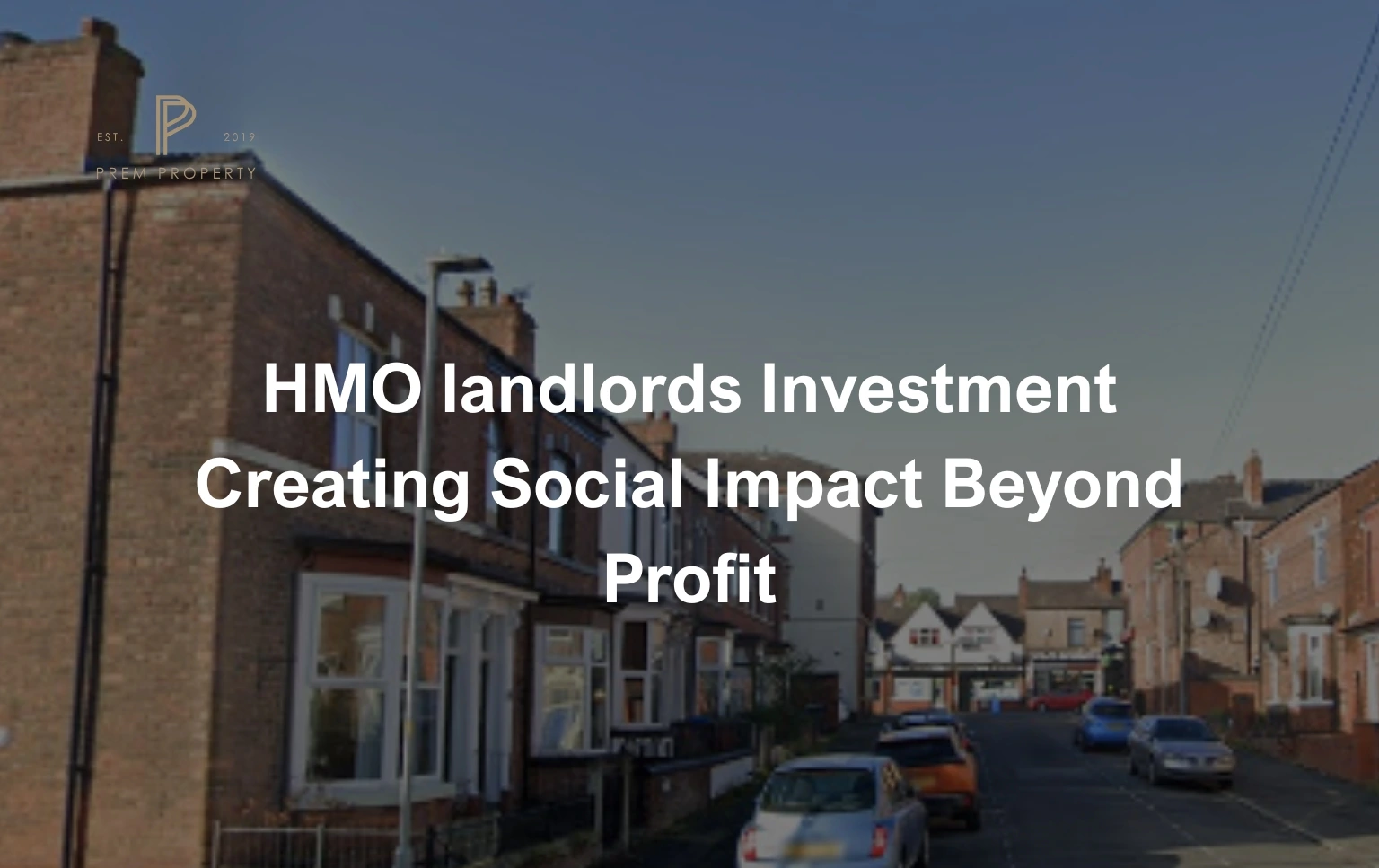Property investment has traditionally focused on maximising returns, but a growing number of landlords are discovering that purpose-driven strategies can deliver both financial success and meaningful social impact. This transformation becomes particularly powerful when applied to Houses in Multiple Occupation (HMO), where strategic partnerships can create substantial change whilst maintaining strong rental yields.
The Evolution of Property Investment
The landscape of property investment is rapidly changing. Whilst traditional buy-to-let strategies remain popular, forward-thinking landlords increasingly recognise that their portfolios can serve a greater purpose. Moreover, this shift towards socially conscious investing doesn’t require sacrificing profitability—rather, it enhances long-term sustainability and creates additional value streams.
Consequently, many property investors are exploring how their assets can address pressing social issues whilst generating consistent returns. This approach particularly resonates with HMO operators who already understand the importance of providing quality accommodation to diverse tenant groups.
Case Study: Transforming a Profitable HMO Portfolio
A compelling example emerges from a landlady who operated her HMO successfully for four years. Despite achieving good profits with no operational issues, she recognised an opportunity to create something more meaningful. Furthermore, her awareness of innovative property solutions led her to explore how her personal portfolio could become more purpose-led and fruitful.
The transformation process began with comprehensive discussions about leading with social impact rather than focusing solely on financial metrics. Subsequently, multiple meetings were arranged to explore support costs and evaluate various providers. This thorough approach ensured that the eventual partnership would deliver both financial stability and social benefits.
The Power of Strategic Partnerships
Through careful matchmaking, the landlady connected with partners who shared her vision for creating positive change. The resulting long-term lease arrangement demonstrates how strategic partnerships can achieve multiple objectives simultaneously. Additionally, this collaboration provides housing solutions for vulnerable individuals whilst maintaining the financial security that responsible investing requires.
This partnership model illustrates how property owners can leverage their assets to address housing challenges facing vulnerable populations. Meanwhile, the guaranteed rent solution—which is emphatically not a scheme but a legitimate business model—ensures predictable income streams for property owners.

Benefits of Purpose-Driven Property Investment
The advantages of this approach extend far beyond traditional rental income. Firstly, purpose-driven investments often attract more stable, long-term partnerships that reduce void periods and maintenance concerns. Secondly, these arrangements frequently involve professional management services that handle day-to-day operations, reducing the administrative burden on landlords.
Furthermore, socially impactful investments can provide additional benefits such as enhanced reputation, potential tax advantages, and alignment with Environmental, Social and Governance (ESG) criteria that increasingly influence investment decisions. These factors contribute to long-term portfolio resilience and growth potential.
The Role of Professional Property Companies
Companies like Prem Property specialise in facilitating these transformative partnerships. Their expertise lies in identifying opportunities where social impact and financial returns align effectively. Additionally, they provide the necessary support to navigate complex arrangements and ensure all parties benefit from the collaboration.
Professional property companies bring valuable resources including established networks of social care providers, local authorities, and charitable organisations. This connectivity enables property owners to access opportunities that might otherwise remain hidden or difficult to pursue independently.
Creating Massive Social Impact
The social impact generated through these partnerships extends well beyond individual properties. When vulnerable individuals receive stable, quality accommodation, the positive effects ripple through communities, reducing strain on emergency services, improving health outcomes and enabling people to rebuild their lives effectively.
Moreover, this model creates employment opportunities within local communities and supports social care providers in delivering essential services. The cumulative effect contributes to addressing housing challenges that affect thousands of vulnerable people across the UK.
Financial Sustainability and Growth
Whilst social impact drives these initiatives, financial sustainability remains crucial for long-term success. The guaranteed rent solutions provide property owners with predictable income streams that often exceed traditional rental arrangements. Additionally, long-term lease agreements reduce marketing costs, void periods, and tenant turnover expenses.
These financial benefits enable property owners to expand their portfolios and create even greater social impact over time. The model demonstrates that ethical investing and strong returns are not mutually exclusive but can be powerfully complementary.
Implementation Strategies for Property Owners
Property owners considering this approach should begin by evaluating their existing portfolios to identify suitable properties. HMOs are particularly well-suited to social impact partnerships due to their existing infrastructure for multiple occupancy and established licensing arrangements.
Subsequently, engaging with specialist property companies like Prem Property can provide access to expertise and networks necessary for successful partnerships. These professionals understand the regulatory requirements, support needs, and operational considerations that ensure sustainable arrangements.
Long-Term Impact and Sustainability
The long-term benefits of purpose-driven property investment extend beyond immediate financial returns. Property owners who embrace this model often discover increased satisfaction from their investment activities and stronger relationships with their local communities. Additionally, these approaches position portfolios for future growth as social responsibility becomes increasingly important to investors and tenants alike.
The sustainability of these models depends on maintaining high standards of accommodation whilst providing appropriate support services. This requirement creates opportunities for continuous improvement and innovation within the property sector.

Overcoming Common Concerns and Misconceptions
Many property owners initially hesitate to explore social impact partnerships due to common misconceptions about risk and complexity. However, these concerns often prove unfounded when proper due diligence and professional guidance are employed. For instance, working with established organisations and guaranteed rent providers actually reduces many traditional landlord risks such as void periods, rental arrears, and property damage.
Additionally, the regulatory framework surrounding social housing partnerships has become increasingly robust, providing clear guidelines and protections for all parties involved. This regulatory clarity, combined with professional management services, creates a more secure environment than many traditional letting arrangements.
Market Trends and Future Opportunities
The demand for socially responsible investment options continues to grow across all sectors, and property investment is no exception. Furthermore, government initiatives supporting social housing provision create additional opportunities for property owners who embrace this model. These trends suggest that early adopters will benefit from increased market opportunities and potential financial incentives.
Research indicates that purpose-driven investments often demonstrate greater resilience during economic downturns, as social need remains constant regardless of market conditions. This stability makes socially impactful property investment an attractive option for risk-conscious investors seeking reliable returns.
Building a Legacy Through Property Investment
Beyond immediate financial benefits, purpose-driven property investment enables landlords to build meaningful legacies within their communities. The landlady featured in our case study exemplifies how property owners can transform their approach to create lasting positive change whilst maintaining profitability.
This legacy-building aspect appeals particularly to family investors and those planning succession strategies. Children and grandchildren increasingly value social responsibility, making purpose-driven portfolios more attractive to next-generation inheritors who might otherwise divest from property investments.
The Future of Socially Responsible Property Investment
The transformation from traditional property investment to purpose-driven portfolios represents a significant opportunity for modern landlords. By partnering with organisations that support vulnerable individuals, property owners can create substantial social impact whilst maintaining strong financial returns. Companies like Prem Property facilitate these partnerships through their guaranteed rent solutions, ensuring that social good and commercial success advance together.
Moreover, this evolution in property investment demonstrates that landlords can achieve their financial objectives whilst contributing meaningfully to addressing social challenges. As technology advances and social awareness increases, new opportunities will emerge for innovative partnerships that address housing inequality and support community development.
The integration of sustainability measures, smart home technology, and community-focused services will further enhance the appeal and effectiveness of socially responsible property investment. These developments position forward-thinking landlords to capitalise on emerging trends whilst maintaining their commitment to social impact.
Ultimately, as more property owners embrace this approach, the cumulative impact will contribute significantly to creating positive change within communities across the UK, demonstrating that profitable investing and social responsibility can work hand in hand to build a better future for all.

